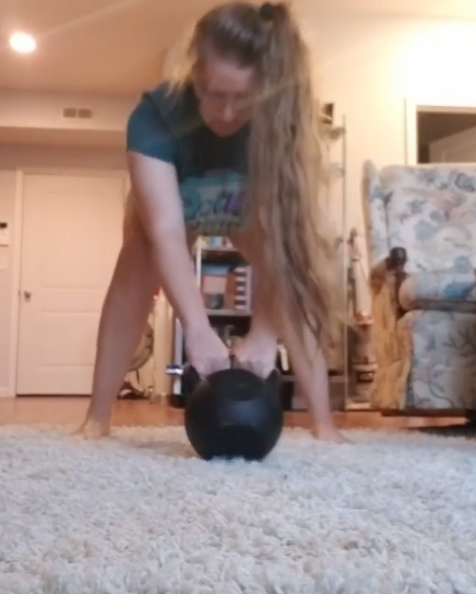Many of us are overloaded, for one reason or another (or several), whether you're still working (thank you, thank you, thank you) or are staying at home (thank you, as well). We're confronted with our feelings and the mechanisms we've been using to avoid them, with nowhere else to go.
This has some of us turning back to old, comforting habits we had previously chosen to let go. If you're there, and struggling ("Why can't I stop eating 'mindlessly'?" "Why can't I stick to the fitness routine I had before this? There isn't that much difference."), I'd like to offer you some compassion: it makes sense, in the face of an unprecedented event, that we'd turn to our oldest, most reliable ways to self-soothe (and, for most of us, food, cooking, reading, sleeping, lots of TV, games, phone scrolling, and all sorts of things we brand as, "lazy," (etc.) in our culture, are what we had access to in our earliest days, or have proven to be most reliable and easily-accessible in other turbulent times).
This has others of us stuck steadfastly to routines, gripping tightly to any sense of "normal" we can find. Our bodies might be clamoring for rest, for slowing down, for comfort, and routines can bring comfort. If you're there, I'd like to offer you compassion as well: it makes sense, in the face of an unprecedented event, that we'd turn to what helps things make sense, to what feels reliable, to our ability to count on ourselves to follow through with what we feel needs to be done.
In either circumstance, we are set on a relatively rigid pattern in hopes that we can reliably bring some sense of predictability in an unpredictable time (and also, in many cases, avoid feeling the very real feelings of fear, of sadness, of anger, of anything you're feeling that feels beyond your ability to cope, especially given then scope of things).
All tagged self awareness
How to Navigate the Pressure of At-Home Workout Perfection
Yesterday was the first time I've gotten my heart rate up via exercise in over two weeks (I think; I lost track in this YA novel dystopia we're living), and that is okay.
A few years ago, it wouldn't have been.
Now may be a time you're feeling frustrated, pressured, or panicky about your fitness routine or your body image. It's a time of high stress (an understatement), and in times of high stress (especially emotional stress), we turn to what we know, to habits that have become well-worn tracks, to coping mechanisms we've used for a lifetime.
Sometimes this is helpful; others it is not.
If you're struggling with feeling like you're not doing the "right" thing when it comes to exercise and movement amidst global chaos, I invite you to ask yourself why you're putting so much pressure on yourself to move in the first place.
Thinking About Thinking (How to Examine What You Think, What You Know, and What You Think You Know)
Challenging our beliefs is one of the most pivotal practices in which we can engage, in fitness and in life, AND, it is not easy.
What does it mean to, “challenge your beliefs?” Quite simply, to consider you may be wrong. To acknowledge you are looking through a lens that may or may not be shared by those around you. To realize what you know is informed by your position or experience, and there are others out there. To wonder, “if this is true for me, but not true for another person, why and where exactly do our experiences differ? What common ground exists? Could I expand my perspective?”
A (cough) challenging practice, to be sure. What’s good for us doesn’t always feel good at every moment.
Why would you want to do it?
Stigma, shame, and disconnection all heavily contribute to negative health outcomes, for ourselves and others, for starters. All of those behaviors begin from the beliefs we hold, particularly, in the fitness industry, about which behaviors and bodies are acceptable, visible, and worthy of respect (and, by contrast and extension, which are unacceptable, invisible, and shame-worthy).
Put in fitness context specifically, every time you say you, "can't eat that," about your favorite food, for example, you're denying yourself pleasure and joy, making a judgment on what you think you deserve, and implying certain foods are meant for certain bodies (and those bodies only).
Sound like what you mean? Is that even accurate to what you intended to say? I didn't think so.



